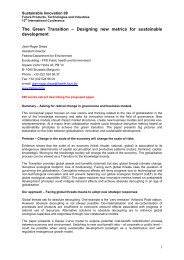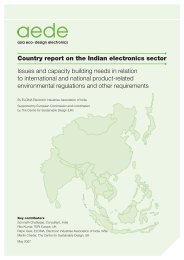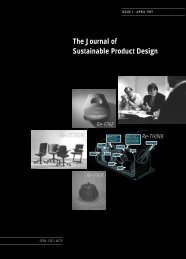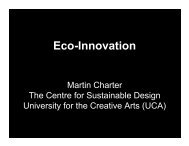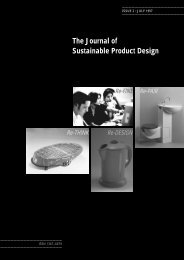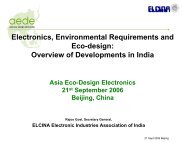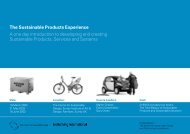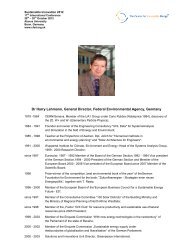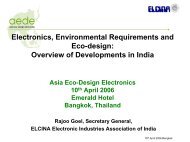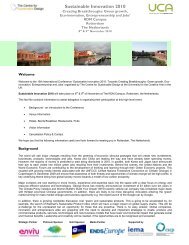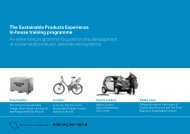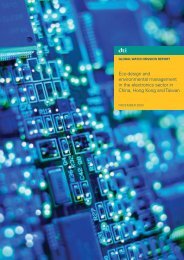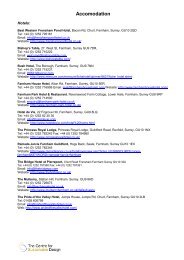acrobat JSPD 8 - The Centre for Sustainable Design
acrobat JSPD 8 - The Centre for Sustainable Design
acrobat JSPD 8 - The Centre for Sustainable Design
You also want an ePaper? Increase the reach of your titles
YUMPU automatically turns print PDFs into web optimized ePapers that Google loves.
After finishing his studies in Electrical<br />
Engineering at the Delft University of<br />
Technology (DUT), Han Brezet received<br />
his PhD in Environment Sociology at<br />
the Erasmus University Rotterdam.<br />
Since 1992, after a career in cleaner<br />
production consultancy, he holds the<br />
chair on eco-design at the sub-faculty<br />
of Industrial <strong>Design</strong> Engineering at<br />
the DUT. In his present position, he is<br />
leader of the <strong>Design</strong> <strong>for</strong> Sustainability<br />
Programme of his Faculty and is<br />
research director of Kathalys, the<br />
Joint <strong>Centre</strong> <strong>for</strong> <strong>Sustainable</strong> Product<br />
Innovation of TNO Industry and<br />
DUT established in 1998.<br />
Professor Han Brezet<br />
JANUARY 1999 · THE JOURNAL OF SUSTAINABLE PRODUCT DESIGN<br />
INTERVIEW<br />
Director, Section of Environmental Product<br />
Development, Faculty of Industrial <strong>Design</strong><br />
Engineering, Delft University of Technology,<br />
the Netherlands<br />
Martin Chartern<br />
Coordinator, <strong>The</strong> <strong>Centre</strong> <strong>for</strong> <strong>Sustainable</strong> <strong>Design</strong>, UK<br />
What do you think are the<br />
key challenges of sustainable<br />
development <strong>for</strong> product<br />
and service development?<br />
One of the key areas that is<br />
often not discussed is the<br />
environmental impact of emerging<br />
service industries eg. in<strong>for</strong>mation<br />
and communication<br />
technologies (ICT). Often it is<br />
believed that services are environmentally<br />
beneficial. <strong>The</strong>re are<br />
a small number of people deliberately<br />
designing eco-efficient<br />
services, however, the majority<br />
of the service industry pay virtually<br />
no attention to eco aspects,<br />
such as infrastructure and<br />
products used to operate these<br />
services. Integrating eco-design<br />
thinking into the service design<br />
of emerging service industries is<br />
essential.<br />
Another key issue is how government’s<br />
should develop national<br />
product-orientated environment<br />
policies. So far this is limited and<br />
there is generally still a focus on<br />
production aspects – learning<br />
from the Dutch-thinking on<br />
Product Oriented-Environmental<br />
Management Systems (POEMS)<br />
approach could contribute to the<br />
debate. So governments should<br />
support different research<br />
projects in this area. One<br />
example is, a very successful<br />
eco-design project in the<br />
Netherlands, which included<br />
over 600 companies, primarily<br />
SMEs (see the following extract<br />
from ‘<strong>The</strong> IC Eco<strong>Design</strong> project:<br />
results and lessons from a Dutch<br />
initiative to implement ecodesign<br />
in small and mediumsized<br />
companies’ by Carolien G<br />
van Hemel, <strong>JSPD</strong>2, July 1997). But<br />
since the project was completed<br />
in 1998, there has been no<br />
proactive government policy<br />
to maintain the focus of these<br />
SMEs on POEMS. Also, more<br />
specific government attention<br />
is needed <strong>for</strong> improving the<br />
energy-efficiency of products<br />
in line with the requirements<br />
of climate change agreements.<br />
It is essential to organise young<br />
students and entrepreneurs to<br />
enable them to increase the<br />
chances of developing better and<br />
more environmentally sustainable<br />
businesses. History has<br />
shown that, with the exception<br />
of what is emerging in Japanese<br />
industries at the moment, that<br />
the old-style dinosaur businesses<br />
are not capable moving into eco-<br />
(re)design, or particularly into<br />
eco-innovation. So how can<br />
25



